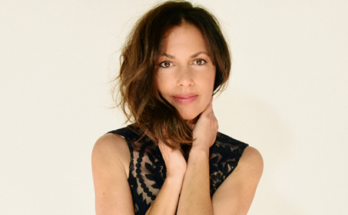Basia Bulat today announced her new album Basia’s Palace–co-produced by frequent collaborator Mark Lawson (who worked with her on previous albums Tall Tall Shadow and The Garden), and mixed by legendary engineer Tucker Martine (Beth Orton, Neko Case, The National)–will be released on February 21, 2025, via Secret City Records. The Montreal-based artist has also shared the glistening lead single, “Baby,” an elegant dance-inflected track augmented by strings courtesy of GRAMMY-nominated arranger Drew Jurecka (Dua Lipa, Alvvays, Metric). The track showcases the stunning, silvery voice of three-time Polaris Music Prize finalist and five-time JUNO Awards nominee Bulat, and arrives alongside a dazzling,one-take video shot on film by director Nora Rosenthal.
“I wrote this song many years ago but never could get the lyrics and performance quite right. I wanted to try it again after becoming a parent–it’s about how we can’t control how or when we’re going to evolve even when we desperately want to. We keep making the same mistakes until we notice a pattern repeating, and even then, change is hard when we have to fully surrender to it. Could I make that predicament something I wanted to dance to? Could I sing the lyrics with joy instead of the sorrow I was channeling in the past?” explains Bulat of “Baby.” “Nothing in my life has made me want to evolve faster, better, stronger than parenthood and the universe keeps throwing that desire back at me with a laugh and a wink, reminding me that things take time and to just love myself for being human. So this song from my past I couldn’t let go of finally made it onto a record–after all the times I tried to get it right I knew I finally had ‘the take’ when my daughter kept asking to hear it again.”
“Basia’s album exists between worlds and between time-scales, referencing her Polish heritage and her dual identities as a singer/songwriter and a mother. These videos emerged in part through conversations we’ve had about the blurred lines that exist between anyone’s senses of self, but especially among performers, as well as our mutual fascination with the objects passed down from generation to generation, and which becomes stand-ins for memory,” says Rosenthal.“The textiles used in ‘Baby,’ for example, belong to Basia’s family. We wanted to build a tiny microcosm of home to exist alongside Basia on stage – three generations of women inhabiting the joy of this song, together.”
Basia’s Palace–the follow up to 2022’s The Garden, which saw her perform as part of The Late Show with Stephen Colbert’s #LateShowMeMusic series, in addition to praise and support from NPR Music’s All Songs Considered, The AV Club, Brooklyn Vegan, Consequence, Popmatters, and more–is now available for pre-order and pre-save. Bulat has also announced North American tour dates in support of the album, beginning February 15th, 2025, in Alberta, Canada. A current itinerary–including select 2024 dates–is below.
The property at the heart of Basia’s Palace is at once her apartment, her jam-space, and the inside of her head. It is a place festooned with love and memory, and bad wiring; it’s a paradise that comes alive in the wee hours of the night–a time that’s suited to video games and Leonard Cohen records, when you sit in all that richness and take in all the mess we inherit. Basia’s Palace got its start in 2022. A new home, a new family, a pause: the singer was finally finding time to hear her own thoughts, to think about old stories, to boot up her Nintendo to play Dragon Warrior 4. It brought to mind anecdotes Bulat had heard about Cohen—how he used to do his best writing at three or four a.m., before his kids woke up, when he’d sit and toy with his Casio’s presets. Now it was Bulat sneaking down to play RPGs or to make music on her MacBook, listening for the spirit-world at a time when the veil felt thinnest. The songs she was creating didn’t feel like anything she had recorded before—MIDI soundscapes that floated and gleamed, like hidden levels above (or below) the action. And as she looked around at the relics and heirlooms of life, she found herself thinking about her memories differently, too, and finding new ways of understanding all that happened in her life across the years.
The album that emerged from all this is the softest and most searching of her career. Basia’s Palace is like a time-travel score, with Bulat akin to Chrono Trigger’s intrepid adventurer, going back into the past to shape the events of the future. After years of releasing records where live performance came first—culminating in The Garden, which reimagined some of her best-loved songs with help from a string quartet—the singer-songwriter wanted to express herself in a completely different way, composing with MIDI instead of piano or guitar. She found herself moving through a dreamworld of whispers, synths, and early Eurovision tunes–and Cohen’s I’m Your Man and her great uncle’s gauzy Maryla Rodowicz LPs. As a result, Basia’s Palace feels like an album that was concealed behind the backings of Bulat’s childhood photos, where mystery and romance mingle over squelchy synths, drum machine, and soaring string arrangements (“My Angel”); where a quiet garden scene is built to a deafening sublime (“Laughter”); where Bulat makes a track she’s been threatening to make for years, a folk-song named for a genre of Polish dance music that was beloved by her late father (“Disco Polo”).
Throughout, Bulat pays tribute to the magic of creation and the spellwork of performance. This is the truest location of Basia’s Palace: not just the Mile End jam-space where she recorded much of this LP; not just her home, her family, or her searching spirit. But the moment itself—the one that happens on-stage, or in the instant of creation—when a song leaves Basia’s heart and leaps onto her lips.


